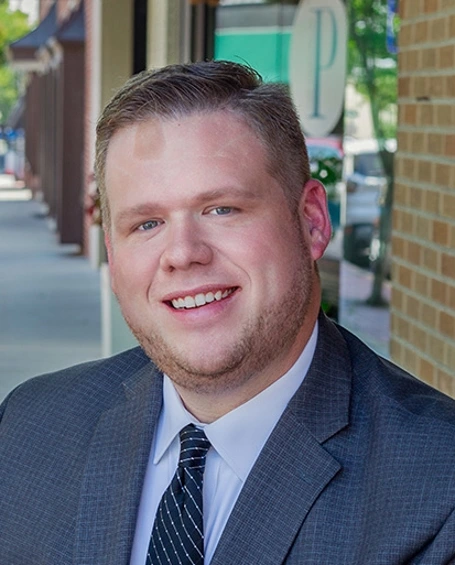Appeals Court Rules in Will Dispute Between Ex-wife and Brother
Benjamin E. Long: Attorney at Schlagel Long, LLC
Expertise in Estate Planning and Probate Law with a Focus on Complex Will Disputes
Benjamin E. Long, a distinguished attorney at Schlagel Long, LLC in Olathe, Kansas, is renowned for his expertise in estate planning and probate law. With a profound understanding of the intricacies involved in wills and estate disputes, Benjamin's legal prowess was notably demonstrated in his analysis of the Trowbridge v. Estate of Trowbridge case, a complex will dispute that reached the Indiana Court of Appeals.
Educational Background and Professional Achievements
Benjamin's journey in law began with a B.S. in Biology from Kansas State University, followed by a J.D. from Washburn University School of Law. His outstanding academic performance led to a Certificate in Advocacy and induction into the Order of the Barristers. He is admitted to the Kansas Bar and the U.S. District Court District of Kansas (2011).
Legal Approach and Philosophy
Benjamin's approach to law is deeply rooted in understanding the human element behind each case. He believes in listening to clients' stories, understanding their values, and recognizing the intellectual, spiritual, and human assets they wish to protect and pass on. His philosophy is not just to manage financial wealth but to preserve and convey the legacy in its entirety.
Specialization in Will and Estate Disputes
The Trowbridge case exemplifies Benjamin's specialization in handling complex will disputes. This case highlighted the importance of updated wills and knowledge of original will locations, along with an understanding of procedural rules governing wills. Benjamin's expertise lies in navigating these complex scenarios, ensuring that the testator's wishes are honored and family conflicts are minimized.
Professional Associations and Recognition
Benjamin's professional excellence is acknowledged through his memberships in the American Bar Association, Kansas Bar Association, and Johnson County Bar Association. His skills as an estate planner and litigator have earned him accolades like the Super Lawyer Rising Star and the Martindale-Hubbell Client Distinction Award.
Contributions to Legal Education and Community
Beyond his legal practice, Benjamin is dedicated to education, serving as an adjunct faculty member at Washburn Law School and coaching the Kansas State University Mock Trial Team. His commitment to legal education reflects his belief in nurturing the next generation of legal professionals.
Personal Life and Community Involvement
When not practicing law or teaching, Benjamin enjoys life in Olathe, Kansas, with his family. His wife, Dr. Andra Long, and their two daughters are central to his life, emphasizing the importance of family in his personal and professional ethos.
In Summary
Benjamin E. Long's career is a blend of professional excellence, educational contributions, and a deep understanding of the human aspects of estate planning and probate law. His involvement in significant cases like Trowbridge v. Estate of Trowbridge demonstrates his capability to handle complex legal scenarios with a focus on preserving legacies and protecting family interests.

Indiana Court of Appeals Case Highlights Importance of Updated Wills
“Recently, the Indiana Court of Appeals decided the case of Trowbridge v. Estate of Trowbridge. The case involved a man, Everett, who, despite their divorce, remained on good terms with his ex-wife, Christal.”
A dispute over a will that made its way to the Indiana Court of Appeals serves as a useful lesson for the importance of having an updated will and knowing where the original will is, as reported in The National Law Review article titled “Where’s the Will? Indiana Court of Appeals Reverses Trial Court’s Presumption of Revocation for Lost Will.”
The Dispute Between Ex-wife and Brother over Everett Trowbridge's Will
The Presumption of Revocation for Lost Wills
The Burden of Proof in Will Contests
Christal called the estate’s attorney, Michael, and told him that she had the will. She then met the attorney at his office. She said she told him that she had the original will. Michael later said that Christal told him that Everett gave her a copy of his will and left the original in his home safe.
Michael took careful notes and said that he would have to find out whether a copy of a will could be offered for probate, before attempting to probate the will she provided.
Michael said he next contacted Trowbridge and asked if he had found a will in Everett’s house. Trowbridge said that no will was found after a search.
Indiana Court of Appeals Reverses Trial Court's Decision
Establishing Possession of the Original Will
Michael uncovered a rule that says where a testator retains possession or control of a will and the will isn’t found at the testator’s death, the presumption is that the will was destroyed. Under this rule, the proponent of the will can rebut the presumption by introducing evidence that supports the conclusion that the will was not in fact revoked. In addition, if a copy of the will is offered for probate and contested, the contesting party, in this case, Trowbridge, has the burden of proof to establish that the will was revoked. According to Michael, once he discovered this rule, he wrote to Christal and told her he would not offer the will for probate. He also suggested that she hire an attorney.
Christal petitioned the court to probate the will, and the trial court found for Trowbridge, saying that the presumption of revocation had established that Everett revoked his will. Christal appealed, and the Indiana Court of Appeals reversed the ruling. The court held that before the presumption of revocation could apply, there must be a predicate finding that the will had remained in the testator’s possession. The only evidence to this point was from Christal, who testified that she maintained possession of the original will.
There was yet another hearing, and the trial court found that the evidence supported the finding that Trowbridge maintained possession of the original will. The court said that Michael’s testimony, supported by handwritten notes, was that when he first spoke with Christal, she said that she had a copy and Everett had the original will in his safe. The trial court applied the presumption of revocation and declined to probate the will. Christal appealed again.
In its analysis, the Court of Appeals first easily affirmed the trial court’s finding that Trowbridge maintained possession of the will, and so he received the benefit of the presumption. However, this is not the end of the question, said the court.
It’s ultimately up to the person who is contesting the will to show that it was revoked, and the trial court had ignored the evidence supporting Christal’s argument that it was not revoked. Included in the court’s decision were these facts:
Everett did not execute his will, until after he and Christal were divorced. Everett continued to list Christal as the beneficiary of his accounts, as recently as the year before he died. He also never enforced the dissolution order requiring Christal to deed the formal marital property to him.
Lessons Learned from Trowbridge v. Estate of Trowbridge
Importance of Knowing the Location of the Original Will
Understanding Procedural Rules Governing Wills
There are two lessons here for estate planning: always know where the original copy of a will is, and be aware of the procedural rules that govern wills. There are procedural rules that shift the burden of proof from one party to another and could be the reason that the wishes of the testator are followed—or not.
Reference: The National Law Review (June 22, 2020) “Where’s the Will? Indiana Court of Appeals Reverses Trial Court’s Presumption of Revocation for Lost Will”

Estate Planning Legacy Planner
Everyday, we work with people who have lost someone they care about. There is so much these folks have to organize and manage. This planner organizes the information they will most need, in our experience, saving so much time and unnecessary cost. Besides organizing your information, it's so important to have a good estate plan that will keep your family out of court and conflict.
Please use the button below to receive a free copy of our Estate Planning Legacy Planner, an organization tool essential to any estate plan designed to help your loved ones take care of you and handle your affairs.
